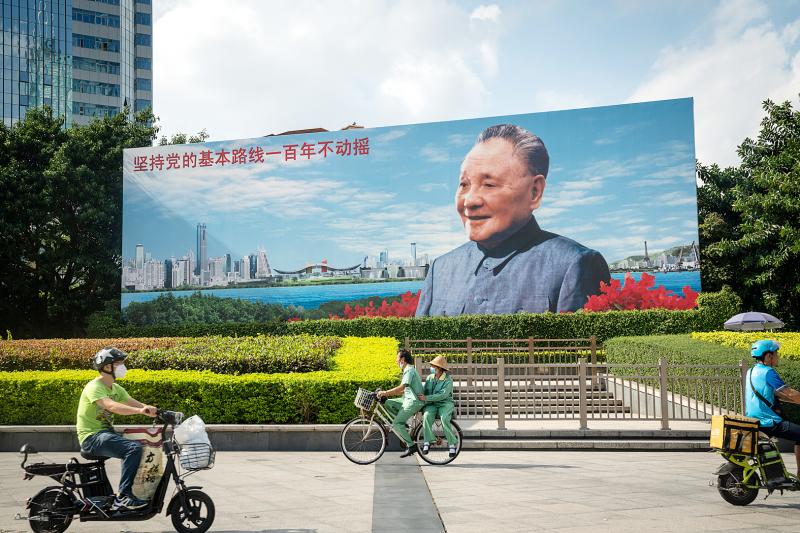Chinese President Xi Jinping (習近平) on Thursday declared victory in an eight-year drive to eradicate extreme poverty in the world’s most populous nation, a key goal of the ruling Chinese Communist Party (CCP).
“We have achieved in a timely manner the poverty alleviation goal of the new era,” Xi said at a meeting of the seven-member Politburo Standing Committee, China’s supreme decisionmaking body, the official Xinhua news agency reported.
The incomes of nearly 100 million people had moved above China’s official poverty line — defined as those who earn less than 11 yuan (US$1.68) per day, he said.

Photo: Bloomberg
After assuming leadership of the CCP eight years ago, Xi made the drive to eliminate extreme poverty by this year one of his top goals.
The party defines it as a step toward achieving what it calls a “moderately prosperous” society, a key part of its moves to improve living standards and underpin its claim to political legitimacy.
The anti-poverty campaign has been focused on rural areas which largely escaped COVID-19 transmission in China this year.
Tens of millions of migrant workers from the countryside were estimated to have lost their jobs due to the closure of factories in the first quarter of the year when China implemented nationwide lockdowns. Gauges of employment have largely recovered since then.
“The declaration tells us more about how the Chinese government defines poverty than about actual levels of deprivation and substantive improvements in people’s lives,” said Sarah Rogers, a lecturer in contemporary China studies at the University of Melbourne who has studied the anti-poverty campaign. “I’m not convinced the campaign has addressed the underlying drivers of deprivation, disempowerment and stark inequality in China”
Earlier this year, Chinese Premier Li Keqiang’s (李克強) set off a nationwide debate on poverty alleviation when he reminded the public that two-fifths of China’s population earned just 1,000 yuan per month on average.
“It’s not even enough to rent a room in a medium-sized Chinese city,” he said during the annual national parliament meeting in May.
The anti-poverty campaign has involved a massive mobilization of state resources, with tens of millions of people relocated from remote villages to newly built homes closer to urban centers.
Elderly and disabled rural residents have received cash handouts and the government has launched schemes to find jobs for the unemployed or those dependent on subsistence farming.
Xi described the achievement, which was given top-billing in state media yesterday, as the result of the “largest and most vigorous battle in human history against poverty.”
China’s poverty line is slightly below the absolute poverty level of the World Bank, at market exchange rates.
China last month removed the final nine counties, all in the mountainous Guizhou Province, from a national list of impoverished counties, Xinhua reported last month.
The average income in those counties had reached 11,487 yuan per year, it said.

Kehinde Sanni spends his days smoothing out dents and repainting scratched bumpers in a modest autobody shop in Lagos. He has never left Nigeria, yet he speaks glowingly of Burkina Faso military leader Ibrahim Traore. “Nigeria needs someone like Ibrahim Traore of Burkina Faso. He is doing well for his country,” Sanni said. His admiration is shaped by a steady stream of viral videos, memes and social media posts — many misleading or outright false — portraying Traore as a fearless reformer who defied Western powers and reclaimed his country’s dignity. The Burkinabe strongman swept into power following a coup in September 2022

‘FRAGMENTING’: British politics have for a long time been dominated by the Labor Party and the Tories, but polls suggest that Reform now poses a significant challenge Hard-right upstarts Reform UK snatched a parliamentary seat from British Prime Minister Keir Starmer’s Labor Party yesterday in local elections that dealt a blow to the UK’s two establishment parties. Reform, led by anti-immigrant firebrand Nigel Farage, won the by-election in Runcorn and Helsby in northwest England by just six votes, as it picked up gains in other localities, including one mayoralty. The group’s strong showing continues momentum it built up at last year’s general election and appears to confirm a trend that the UK is entering an era of multi-party politics. “For the movement, for the party it’s a very, very big

ENTERTAINMENT: Rio officials have a history of organizing massive concerts on Copacabana Beach, with Madonna’s show drawing about 1.6 million fans last year Lady Gaga on Saturday night gave a free concert in front of 2 million fans who poured onto Copacabana Beach in Rio de Janeiro for the biggest show of her career. “Tonight, we’re making history... Thank you for making history with me,” Lady Gaga told a screaming crowd. The Mother Monster, as she is known, started the show at about 10:10pm local time with her 2011 song Bloody Mary. Cries of joy rose from the tightly packed fans who sang and danced shoulder-to-shoulder on the vast stretch of sand. Concert organizers said 2.1 million people attended the show. Lady Gaga

SUPPORT: The Australian prime minister promised to back Kyiv against Russia’s invasion, saying: ‘That’s my government’s position. It was yesterday. It still is’ Left-leaning Australian Prime Minister Anthony Albanese yesterday basked in his landslide election win, promising a “disciplined, orderly” government to confront cost-of-living pain and tariff turmoil. People clapped as the 62-year-old and his fiancee, Jodie Haydon, who visited his old inner Sydney haunt, Cafe Italia, surrounded by a crowd of jostling photographers and journalists. Albanese’s Labor Party is on course to win at least 83 seats in the 150-member parliament, partial results showed. Opposition leader Peter Dutton’s conservative Liberal-National coalition had just 38 seats, and other parties 12. Another 17 seats were still in doubt. “We will be a disciplined, orderly